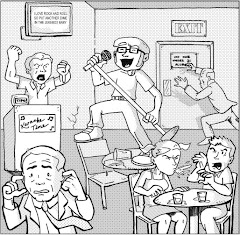Optic Nerve #1, April 1995, Drawn & Quarterly Publications
by Adrian Tomine
Optic Nerve is the saddest comic book I’ve ever been happy to read. Its five short stories range from melancholy to macabre to tragic, but despite their varied subjects, they all have one thing in common: they end way too soon for their own good. I’d call them “slice of life” tales, but I think a sliver would be more accurate, since, just when Tomine gives you a taste of his storytelling strength, he pulls the wool back over your eyes. It’s bad enough that his peculiar vignettes inspire instant sympathy for their characters, but they also leave you wondering what’s happened to them. Have you ever seen an old friend across the room at a party, and he leaves unannounced before you get a chance to catch up with him? Optic Nerve is the comic book equivalent.
This inaugural issue’s five stories range from a single page to eleven pages in length, but Tomine has mastered the synthesis of narrative, page layout, and illustrative choreography to make even the briefest of tales impactful. Consider the single-paged “Drop,” in which a son explains his father’s accidental death in Japan. The poor fellow had car trouble, and the pitch blackness of night, stepped off of an overpass. The last panel, which traces the poor man’s hand with just a touch of white light, is as poignant as it is tragic, describing the cruelty of death with an ironic touch of grace. A mere four panels later, and I’m sad to see the guy go.
The issue’s lead story, “Sleepwalk,” is meatier yet just as succinct in its characterization. When Mark’s ex-girlfriend invites him to dinner for his twenty-fourth birthday, the two share a night reminiscent of the heights in the relationship. At the end of the night, Mark leans in for a kiss, but Carrie rejects him and explains that she wanted to rekindle their friendship. On the emotional drive home, Mark nearly falls asleep and crashes into a truck, whose strangely understanding driver decides to leave the scene and avoid confronting the authorities. At the end of this story, Mark is left alone, next to his totaled car, waiting for a pick-up truck in the dark. Any fan of John Cusack could relate to and appreciate this story, and it plays as the most successful contemporary romantic yarn I’ve ever read. If those old romance comics continued today, this is what they would be, or should be, like.
“Echo Ave.” boasts a more macabre undertone, when a couple spies their new neighbor participating in some lurid sexual acts, including licking his partner’s feet. When the woman of the house goes to get some refreshments for the “show,” the man yelps in surprise and frantically dissuades her from looking out the window again. What did he see? Was it violent or overwhelming graphic? We never find out. I wonder if even Tomine knows, or rather if his point was for the audience to explore their innermost derelictions. What would make you turn away? What sight wouldn’t you wish upon a loved one?
In “Long Distance,” an out-of-town boyfriend pushes his girlfriend to talk dirty to him over the phone. She continually refuses until he sends her a script to read, and she finally gives in, perhaps to their relationship’s detriment. “I’m saying the words,” she describes, “but my mind is somewhere else, far away.” Simple, elegant, and sad -- yet, a feeling we can all relate to, perhaps not circumstantially, but sympathetically. “Lunch Break” evokes a similar feeling, as an elderly lady makes herself a sandwich and eats it in a beat-up classic car, wherein she remembers having lunch with her lover when they were younger. Five pages, a lifetime’s worth of romance. When I read this last issue, I literally thought, “Well, Tomine did it again.”
I assume that this issue of Optic Nerve set the tone for the entire series, and if this first effort is any indication, Tomine produces consistently introspective, elegantly executed visual prose every time. His brushstroke represents the independent genre at its best, with expressive characterization, detail-oriented backdrops, and an overarching simplicity that makes you think anyone can make comics as much as it shames you into putting away from drawing pens for good. We all have these feelings, but who among us can put them down on paper so effectively, so seemingly effortlessly? Who can remove these emotions and embody them into vignettes with just enough objectivity to solidify these feelings as entities in and of themselves. Yes, these stories strike a nerve, alright. I encourage you to see for yourself.
Subscribe to:
Post Comments (Atom)



1 comment:
I love the comic book because I think that are so funny, I lived between the comic store and the viagra online's office, so I had bought a lot of comic books.
Post a Comment